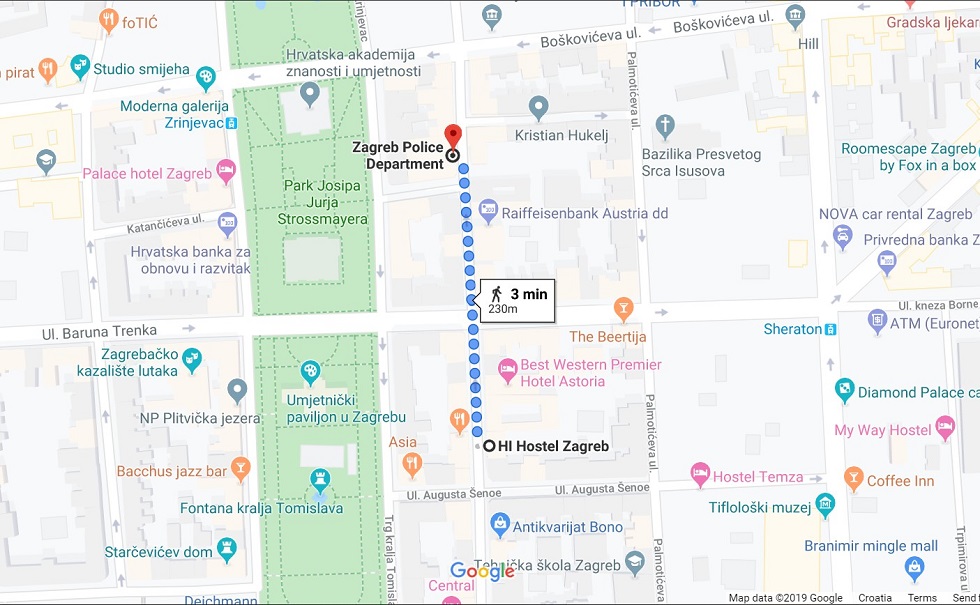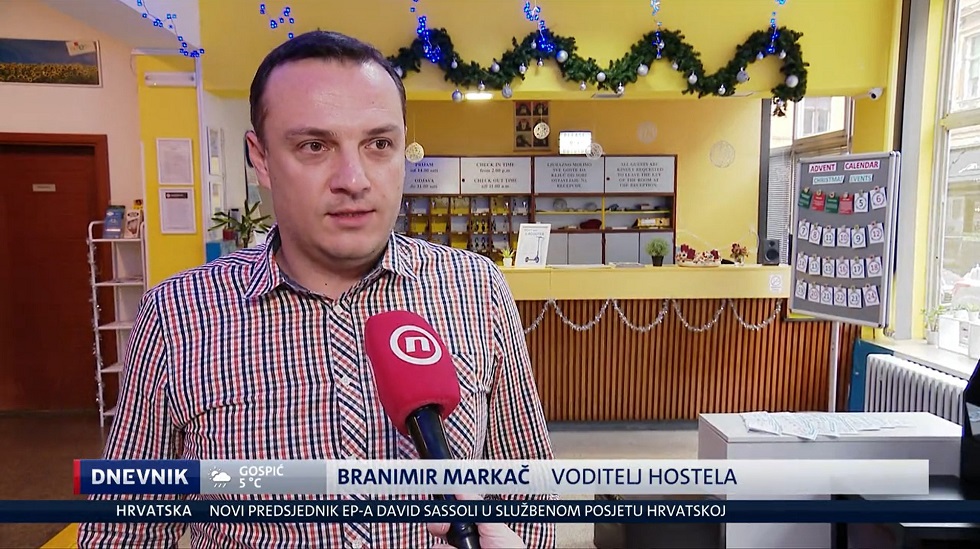Did the Croatia police (MUP) really abduct two Nigerian students who were legally at a sports competition in Croatia, on a tram just steps away from their hostel in the middle of Zagreb, and banish them to Bosnia?
Kenneth Chinedu Eboh and Uchenna Alexandro Abia, two Nigerian students who came to Pula to compete in table tennis, claim that that is exactly what happened, while MUP claims in a statement that they had checked out of their hostel, the name of which has now been revealed. They allegedly departed the HI Youth Hostel in Zagreb with their passports on November 18 and arrived in Bosnia illegally. However, MUP claims that they still do not know how the students got to Bosnia.
Over the past two days, this alleged expulsion has captured the media attention of Croatia and neighboring states. And, the story has now reached the rest of Europe after it was published in The Guardian yesterday.
Croatia Police and Nigerian Students Not Telling Whole Story
Based upon what is known so far, neither MUP nor the Nigerian students are telling the whole story, according to Gordan Duhaček/Index on December 5, 2019.
It has been confirmed that Nigerian students have obtained a visa for Croatia at the embassy in Pretoria and that they entered the country legally. They stayed at the Veli Joze Hotel in Pula while competing in table tennis at the 5th World InterUniversities Championships. However, their version of events regarding their alleged detention and forcible expulsion from Zagreb to Bosnia have not yet been corroborated.
The Nigerian students ended up in a migrant camp in Velika Kladuša in Bosnia, but were they really expelled by the Croatian police under the threat of violence? That cannot be confirmed, because the claim is based solely on the testimony of two students and has not been substantiated with evidence. And did the Croatian police really abduct them on a Zagreb tram, in front of other riders, in the middle of the city? That allegation has not been confirmed either, but MUP could easily inspect surveillance cameras on Zagreb trams and inform the public of their findings.
Nigerian Students’ Story Conflicts with MUP and Hostel Account
The most suspicious part of Eboh and Abijah’s story is that they do not remember the name of their hostel in Zagreb. Then, as they claim, a friend from Croatia sent them their passports, which he collected at the hostel reception desk. Those passports arrived by mail in Velika Kladuša on November 25, which has been confirmed by independent sources from the field. How did that friend know which hostel to go to if they couldn’t tell him the name? Did he stay with them in the same hostel? And what is the name of the friend who sent them their passports?
According to Vecernji List and other sources, the students stayed at the HI Youth Hostel on Petrinjska Ulica 77. That hostel is a mere 230m, or a 3-minute walk, from the MUP central office on the same street at Petrinjska Ulica 30, which casts doubt on the students’ claim that the Croatian police wouldn’t be bothered with confirming their travel documents at the HI Youth Hostel. According to their allegations, they were taken instead to the MUP central station 230m away.

Students Took Their Passports and Luggage Upon Check-out
Hostel manager Branimir Markač confirmed in an interview with Dnevnik Nove TV that the students spent two nights at his hostel in Downtown Zagreb, checking in on November 16 (rather than November 17 as the students claim) and noted that they spent some of their time in the hostel lobby. They asked the front desk for some information; like the location of the nearest exchange office. After spending their first night and day at the hostel and taking side trips around town; the two Nigerians decided to extend their stay another night, which they did at 22:23h on November 17. Markač says he has their bill as evidence. They checked out of the hostel on November 18 at 11:00h and didn’t leave anything behind. This conflicts with the students’ claim that they were abducted by Croatian police on the evening of November 17, and sent to Bosnia, with their travel documents and luggage remaining at the hostel.
“Absolutely no one came to the hostel for their travel documents, nor would we ever hand over anybody else’s belongings,” Markač emphasized.
MUP has also claimed that Eboh and Abia left the hostel for an unknown destination, after checking out, taking their passports and paying their bills.

Who sent their passports to Velika Kladuša?
Is the friend who sent the Nigerian students their passports by mail (allegedly after retrieving them from the HI Youth hostel) their colleague from Nigeria? He also stayed in Croatia after his six-day visa expired and requested asylum with his passport at the MUP central station (230m from the hostel) on November 27, after reporting his passport lost at the same station on November 18. The police know his name but have not yet published it. He is likely being housed Hotel Porin, a reception center for asylum seekers in Zagreb, but police have been silent regarding his identity and whereabouts.
Were Smugglers involved?
According to Gordan Duhaček/Index; there is only one scenario in which the Croatian police might not be guilty of expelling Eboh and Abijah. Suppose that the Nigerian students went to the sports competition in Pula with the sole intention of staying illegally in the European Union after their six-day visa expired. Like most migrants, they don’t want to stay in Croatia, but want to go to one of the larger and more economically successful EU member states, so they paid smugglers, who are undoubtedly working throughout the region, to transfer them to Italy or Slovenia, i.e. to the Schengen free movement zone in the European Union.
Sources have confirmed that the students’ arrived at the competions without rackets or sports equipment and lost every match. However, Hajdi Karakaš/Jutarnji List reports that other competitors considered them to be good-natured and pleasant to be around.
Smugglers Often Deceive Migrants
As Duhaček points out, there have been many reports of smugglers deceiving their “clients” and not taking them to the destinations they had promised. In that context, it’s possible that the Nigerian students paid smugglers to take them to Slovenia or Italy but were tricked and brought to the Bosnian border. There the smugglers told them to walk through the forest where they would reach Italy or Slovenia.
Of course, Eboh and Abia followed instructions, and only when they came across migrants at Velika Kladuša did they realize that they had been duped and taken to Bosnia instead. There, they heard stories from other migrants about the aggressive pushback policy implemented by the Croatian police. That policy, as reported by The Guardian and other media outlets, involves bring migrants in vans back to the Bosnian border and illegally expelling them there under the threat of violence. With that information, they theoretically constructed the story they have shared Bosnia portal Žurnal and other media outlets.
Apparent Lack of Border Control
But even if that’s what really happened, it remains unclear how it was possible for a smuggler to take the Nigerian students to the Bosnian border, a border monitored 24 hours a day by drones, thermal cameras and thousands of police officers, and remain completely undetected.
In other words, the only scenario in which the Croatian police are not guilty is the same scenario in which the Croatian police are utterly incompetent, according to Duhaček.
Another Scenario Which Implicates Both Parties
Another possible scenario, which would involve wrongdoing by MUP and the Nigerian students, has the Nigerian students leaving their passports somewhere (or with their unidentified friend) after checking out of the HI Youth Hostel and setting off for Slovenia or Italy without travel documents. Croatian police intercept them somewhere outside of Zagreb and take them for illegal migrants, particularly after they were not able to furnish their travel documents. The Croatian police then put them in a van with other illegal migrants and forcibly expel them at the Bosnian border.
According to this second scenario, Eboh and Abia understand that admitting that they had set out for Slovenia or Italy without travel documents would identify them as illegal migrants regardless of the conduct of the Croatian police, perhaps compromising their chances of being granted asylum. Their unidentified friend (perhaps their Nigerian colleague in Zagreb) held on to their travel documents and sent them to Velika Kladuša after learning that things had not gone as planned.
Regardless of circumstance, if Zagreb police randomly pulled two people of color off of a tram, in the middle of Zagreb, and in an area frequented by tourists from all over the world; Croatia has a much more serious problem to contend with.
For updates on this story, the activities of the Croatian police (MUP) and the migrant crisis in Croatia; follow our Politics page here.










